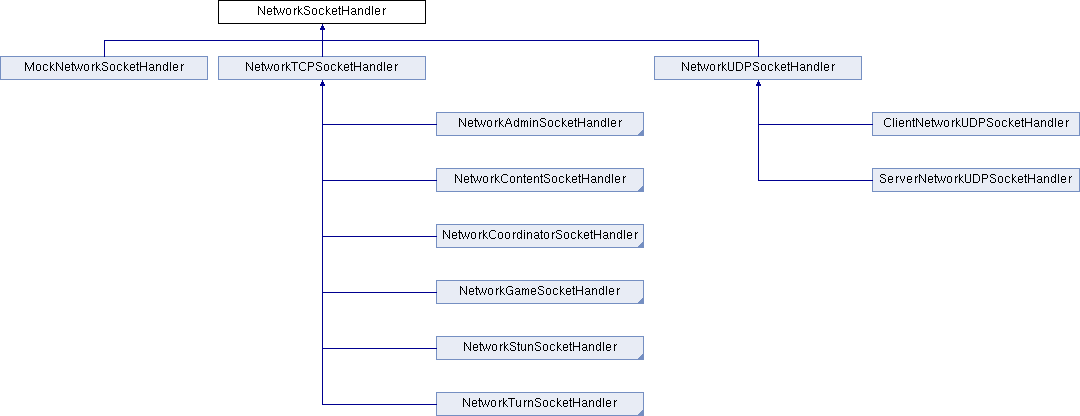SocketHandler for all network sockets in OpenTTD. More...
#include <core.h>

Public Member Functions | |
| NetworkSocketHandler ()=default | |
| Create a new unbound socket. | |
| virtual | ~NetworkSocketHandler ()=default |
| Close the socket when destructing the socket handler. | |
| void | MarkClosed () |
| Mark the connection as closed. | |
| bool | HasClientQuit () const |
| Whether the current client connected to the socket has quit. | |
| void | Reopen () |
| Reopen the socket so we can send/receive stuff again. | |
Protected Attributes | |
| std::unique_ptr< class NetworkEncryptionHandler > | receive_encryption_handler = nullptr |
| The handler for decrypting received packets. | |
| std::unique_ptr< class NetworkEncryptionHandler > | send_encryption_handler = nullptr |
| The handler for encrypting sent packets. | |
Private Attributes | |
| bool | has_quit = false |
| Whether the current client has quit/send a bad packet. | |
Friends | |
| struct | Packet |
Detailed Description
Member Function Documentation
◆ HasClientQuit()
|
inline |
Whether the current client connected to the socket has quit.
In the case of UDP, for example, once a client quits (send bad data), the socket in not closed; only the packet is dropped.
- Returns
- true when the current client has quit, false otherwise
Definition at line 72 of file core.h.
Referenced by ClientNetworkGameSocketHandler::CloseConnection(), ServerNetworkGameSocketHandler::CloseConnection(), ServerNetworkGameSocketHandler::Receive_CLIENT_COMMAND(), ServerNetworkGameSocketHandler::Receive_CLIENT_ERROR(), ServerNetworkGameSocketHandler::Receive_CLIENT_GETMAP(), ServerNetworkGameSocketHandler::Receive_CLIENT_IDENTIFY(), ServerNetworkGameSocketHandler::Receive_CLIENT_MAP_OK(), ServerNetworkGameSocketHandler::Receive_CLIENT_QUIT(), ServerNetworkGameSocketHandler::Receive_CLIENT_SET_NAME(), and ClientNetworkGameSocketHandler::Receive_SERVER_CLIENT_INFO().
◆ MarkClosed()
|
inline |
Mark the connection as closed.
This doesn't mean the actual connection is closed, but just that we act like it is. This is useful for UDP, which doesn't normally close a socket, but its handler might need to pretend it does.
Definition at line 64 of file core.h.
Referenced by ClientNetworkGameSocketHandler::ClientError(), and NetworkTCPSocketHandler::CloseConnection().
◆ Reopen()
|
inline |
Reopen the socket so we can send/receive stuff again.
Definition at line 77 of file core.h.
Referenced by NetworkUDPSocketHandler::HandleUDPPacket().
Friends And Related Symbol Documentation
◆ Packet
Field Documentation
◆ has_quit
|
private |
◆ receive_encryption_handler
|
protected |
The handler for decrypting received packets.
Definition at line 47 of file core.h.
Referenced by ServerNetworkAdminSocketHandler::Receive_ADMIN_AUTH_RESPONSE(), ServerNetworkGameSocketHandler::Receive_CLIENT_AUTH_RESPONSE(), and ClientNetworkGameSocketHandler::Receive_SERVER_ENABLE_ENCRYPTION().
◆ send_encryption_handler
|
protected |
The handler for encrypting sent packets.
Definition at line 48 of file core.h.
Referenced by ServerNetworkAdminSocketHandler::Receive_ADMIN_AUTH_RESPONSE(), ServerNetworkGameSocketHandler::Receive_CLIENT_AUTH_RESPONSE(), and ClientNetworkGameSocketHandler::Receive_SERVER_ENABLE_ENCRYPTION().
The documentation for this class was generated from the following file:
- src/network/core/core.h